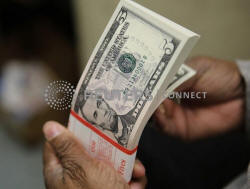Dollar buoyed as dovish central banks, risk aversion hit
rivals
 Send a link to a friend
Send a link to a friend
 [March 28, 2019]
By Tommy Wilkes [March 28, 2019]
By Tommy Wilkes
LONDON (Reuters) - The dollar rose on
Thursday as rival currencies struggled following more dovish soundings
from central banks, while the yen gained as investor worries about the
global economy grew.
The Reserve Bank of New Zealand joined a growing list of central banks
that have turned dovish amid signs of a slowing global economy, saying
on Wednesday its next move in interest rates was likely to be a cut.
With many currencies on the defensive, the dollar has brushed aside a
decline in benchmark U.S. Treasury yields to 15-month lows. The dollar
index against a basket of six major currencies gained 0.2 percent to
96.974 and headed for its third day of gains.
The euro held around $1.1255, away from 21-month lows of $1.1167 touched
a few weeks ago.

It has lost nearly half a percent this week as the benchmark 10-year
German bund yield fell to a 2 1/2-year low. Dovish comments from ECB
President Mario Draghi on Wednesday did little to support the euro.
"The market is becoming more concerned about global growth conditions,
especially to the detriment of the euro zone. The dollar strength is on
the back of other currencies getting hurt," said Manuel Oliveri, FX
analyst at Credit Agricole.
However, Oliveri said that he did not advise chasing the euro much lower
because of the "low bar" for the euro zone economy to surprise on the
upside.
Graphic: Euro vs U.S. dollar - https://tmsnrt.rs/2WmLunE
The Swiss franc slipped from 20-month highs hit on Wednesday, falling
0.2 percent against the euro to 1.1204 francs. Analysts noted that
levels below 1.12 have in the past prompted intervention by the Swiss
National Bank to stop the franc from further strengthening.
[to top of second column] |

A packet of former U.S. President Abraham Lincoln five-dollar bill
currency is inspected at the Bureau of Engraving and Printing in
Washington March 26, 2015. REUTERS/Gary Cameron/File Photo

The New Zealand and Australian dollars managed to recover somewhat after the New
Zealand central bank's dovish shift hit both currencies lower on Wednesday.
Growth-sensitive currencies have taken a beating recently on rising risks to the
global economy.
Analysts at ING said investors had gone too far in expecting a U.S. rate cut
this year, but that the dollar remained vulnerable for now.
"For the short term, however, DXY looks vulnerable to the massive erosion in USD
yield differentials and could easily head back to 96," they wrote.
The yen rallied 0.2 percent to 110.33 to the dollar as Japanese shares fell, but
it was some distance from Monday's six-week high of 109.70.
Broader risk aversion in markets also supported demand for the yen, which is
considered a safer place to park cash in times of uncertainty.
Sterling fell towards $1.31 after British Prime Minister Theresa May's offer on
Wednesday to quit failed to sway hard-line opponents to back her Brexit
withdrawal deal.
(Editing by Larry King and Susan Fenton)
[© 2019 Thomson Reuters. All rights
reserved.] Copyright 2019 Reuters. All rights reserved. This material may not be published,
broadcast, rewritten or redistributed.
Thompson Reuters is solely responsible for this content.
 |